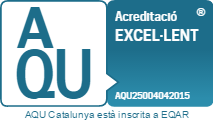Bachelor's degree in Journalism
Duration
Four academic years
Fee
€1.248,52 € (Approximate price for EU students. Other types) (*)
(*) Includes the charges for handling the registration and transcription, publications and academic forms and student insurance.
Places
80
Admissions
Branch of knowledge
Social and legal sciences
Schedule
Full-time study programme (morning and afternoon)
Academic year
From September to June
Credits
240 ECTS credits Basic subjects: 64; compulsory subjects: 114; optional subjects: 38; external internship: 14; bachelor's degree final project: 10
Languages
Catalan, Spanish and English (depending on the subject)
Organizer

